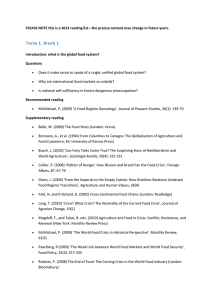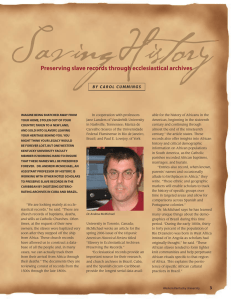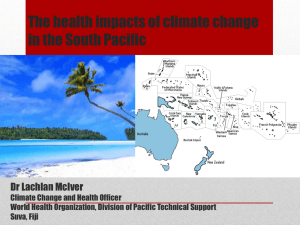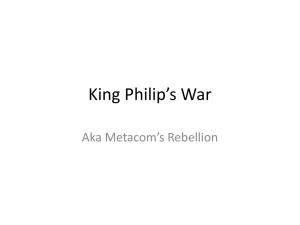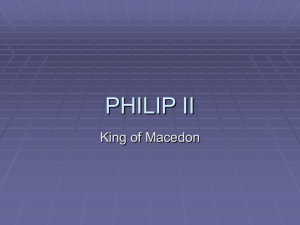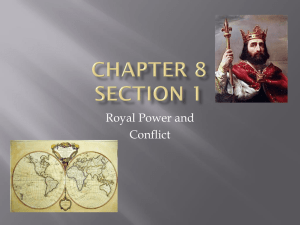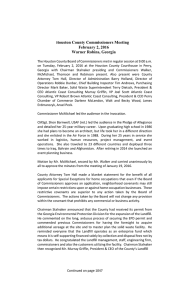short bio of not more than 60 words, including your PhD degree in
advertisement
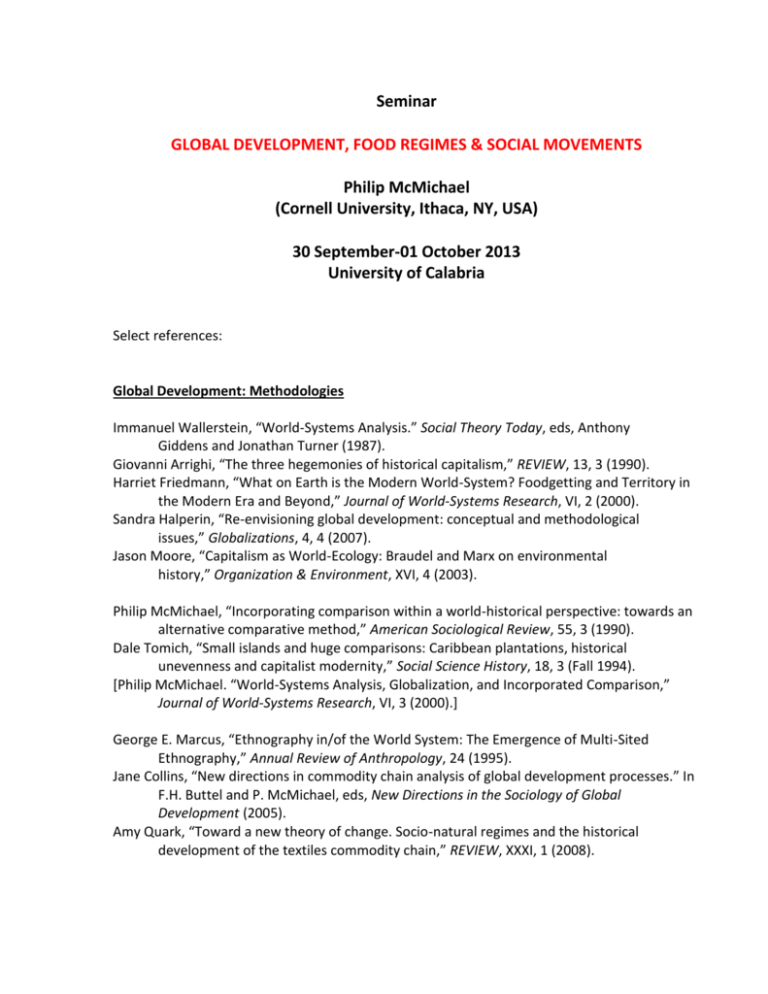
Seminar GLOBAL DEVELOPMENT, FOOD REGIMES & SOCIAL MOVEMENTS Philip McMichael (Cornell University, Ithaca, NY, USA) 30 September-01 October 2013 University of Calabria Select references: Global Development: Methodologies Immanuel Wallerstein, “World-Systems Analysis.” Social Theory Today, eds, Anthony Giddens and Jonathan Turner (1987). Giovanni Arrighi, “The three hegemonies of historical capitalism,” REVIEW, 13, 3 (1990). Harriet Friedmann, “What on Earth is the Modern World-System? Foodgetting and Territory in the Modern Era and Beyond,” Journal of World-Systems Research, VI, 2 (2000). Sandra Halperin, “Re-envisioning global development: conceptual and methodological issues,” Globalizations, 4, 4 (2007). Jason Moore, “Capitalism as World-Ecology: Braudel and Marx on environmental history,” Organization & Environment, XVI, 4 (2003). Philip McMichael, “Incorporating comparison within a world-historical perspective: towards an alternative comparative method,” American Sociological Review, 55, 3 (1990). Dale Tomich, “Small islands and huge comparisons: Caribbean plantations, historical unevenness and capitalist modernity,” Social Science History, 18, 3 (Fall 1994). [Philip McMichael. “World-Systems Analysis, Globalization, and Incorporated Comparison,” Journal of World-Systems Research, VI, 3 (2000).] George E. Marcus, “Ethnography in/of the World System: The Emergence of Multi-Sited Ethnography,” Annual Review of Anthropology, 24 (1995). Jane Collins, “New directions in commodity chain analysis of global development processes.” In F.H. Buttel and P. McMichael, eds, New Directions in the Sociology of Global Development (2005). Amy Quark, “Toward a new theory of change. Socio-natural regimes and the historical development of the textiles commodity chain,” REVIEW, XXXI, 1 (2008). Global Development: Food Regimes Harriet Friedmann and Philip McMichael, “Agriculture and the State System. The rise and decline of national agricultures, 1870 to the Present,” Sociologia Ruralis 29, 2 (1989). Farshad Araghi, “Food regimes and the production of value: some methodological issues,” Journal of Peasant Studies, 30, 2 (2003). Philip McMichael. “A food regime genealogy,” Journal of Peasant Studies, 36, 1 (2009). Philip McMichael, “Food regime crisis and revaluing the agrarian question.” In Rethinking Agricultural Policy Regimes: Food Security, Climate Change and the Future Resilience of Global Agriculture, eds, A. Almas and H. Campbell (2012). Raj Patel, “The long green revolution,” The Journal of Peasant Studies, 40, 1-2 (2013). Global Development: Social Movements Arturo Escobar, “Beyond the Third World: Imperial globality, global coloniality and antiglobalization social movements,” Third World Quarterly, 25, 1 (2004). María Elena Martínez-Torres and Peter M. Rosset, “La Vía Campesina: the birth and evolution of a transnational social movement,’ The Journal of Peasant Studies, 37, 1 (2009). Hannah Wittman, “Reworking the metabolic rift: La Vía Campesina, agrarian citizenship, and food sovereignty,” The Journal of Peasant Studies, 36, 4 (2009). Philip McMichael, “Peasants make the own history, but not just as they please…,” Journal of Agrarian Change, 8, 2-3 (2008). Alessandra Corrado, “New Peasantries and alternative agro-food networks: the case of Réseau Semences Paysanne.” In Research in Rural Sociology and Development, vol 16 (2010). Elisa da Vià, “Seed diversity, farmers’ rights, and the politics of representation,” International Journal of Sociology of Agriculture and Food, 19, 2 (2012). Philip McMichael, “Changing the subject of development.” In Contesting Development: Critical Struggles for Social Change, ed, Philip McMichael. New York: Routledge (2010). 2
